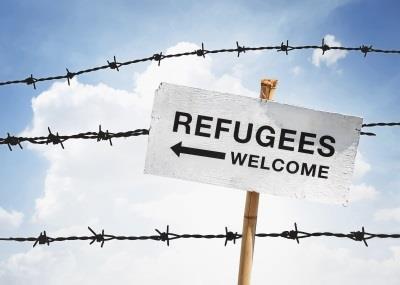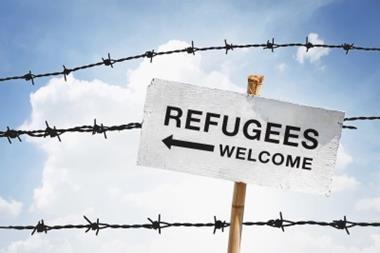Fingers are being pointed at the European Union for failing to resolve the EU migrant crisis and political tensions are rife across the continent. Two experts – David Lea, senior Europe analysts at Control Risks and Laurence Allen, senior manager, Latin America and Caribbean at IHS – speak exclusively to StrategicRISK about the situation

For all the flak it has received in recent months, the European Union is taking steps to do something about the EU migrant crisis. It recently struck a deal with Turkey, after more than one million migrants reached Europe in 2015.
Under this agreement, migrants who arrive illegally in Greece will be sent back to Turkey if they do not apply for asylum or if their claim is rejected. For every Syrian migrant returned to Turkey, the EU will take in a Syrian who has made a legitimate request.
Control Risks’ David Lea and IHS’ Laurence Allen explain more in a discussion with StrategicRISK.
Lea: There are concerns that the Turkey agreement could fall through. As far as I can see, even if the agreement with Turkey works, there will still be a strong resurgence in migrant crossings and overland attempts as spring softens and turns into summer.
Politicians all over Europe are frustrated that, at European level, no real solutions to the crisis have emerged. It’s getting harder and harder to fend off arguments of the political right, who say that the numbers of migrants are unsustainable, particularly for the countries that are doing their fair share to take people in.
Additionally, Alternative für Deutschland [a German far-right anti-immigration party] secured a high percentage of the votes in the regional elections and the Sweden Democrats [a far-right and anti-immigration party] is still doing well in the polls. To an extent the rise of anti-immigration parties is spreading throughout Europe, although I don’t think Europe is in any danger of seeing any of these movements reaching power.
Allan: Far right and anti-immigrant groups across the Schengen area (all EU countries except Bulgaria, Croatia, Cyprus, Romania, Ireland and the UK) have been actively protesting against migration, including in countries that do not have a history of anti-immigration movements.
At the German regional elections in March, the government suffered badly in three of its states and right-wing parties who are generally anti-immigration attracted a good share of votes.
The French regional elections in December showed similar results, although the far-right, anti-immigration party, the National Front, won fewer seats than expected. So in the two largest Schengen economies, anti-immigration parties have had a profound impact politically, even if their increased popularity has not yet been fully represented in terms of seats in parliament yet.
SR: Last year, most migrants travelled to Germany or Sweden, via Greece and the Balkan countries. But are countries that are not on the migrant route, such as Portugal or Spain, affected by the migrant crisis?
Allan: In Portugal, the migrant crisis has a far lower profile than in its fellow member states, which are geographically more exposed to the migrant flows.
Portugal has a long history of immigration and a significantly large migrant community. But it doesn’t have a big Muslim migrant community. So the dynamics there are different to, for example, Germany which has a very large Muslim community, mainly from Turkey.
It is also worth noting that Portugal is willing to accept many more refugees than apportioned under the EU agreement.
Lea: Spain is an interesting case. Before the EU migrant crisis, Spain was very much in the frontline for migration from Africa. A lot of sub-Saharan Africans travelled to either Morocco or Western Sahara and, on small and dangerous inflatable boats, they crossed the Strait of Gibraltar to arrive in either Southern Spain or the Canary Islands. However, when the central Mediterranean route towards Italy and later Greece opened, and as patrols increased, migrant flows to Spain declined significantly.
So now that Greece is experiencing a mass influx of migrants, Spain is reluctant to share its burden, because it didn’t think other European countries were supportive enough when the Canary Islands were in the frontline for migration.
SR: Following the disposal of Libyan leader Muammar Gaddafi in 2011 and Libya’s subsequent fall into chaos and civil war, Italy saw an increased influx of migrants. What are Italy’s sentiments towards the EU migrant crisis?
Lea: Italy is concerned that if the Turkey agreement and the Frontex operation [Border controls of the European Union’s external borders] are effective at reducing the migrant flows into Greece, there will likely be longer crossings to Italy by sea or overland via the Balkans, Albania and Montenegro. Italy is right to be concerned about this because Libya is increasingly an inefficiently governed space.
SR: How do you see the migrant crisis developing in months to come?
Allan: The migrant crisis will continue to put a lot of stress on the Schengen area, but we see temporary exceptions to the free movement of goods and people in the Schengen area as being exactly that – temporary. There are concerns that temporary exceptions will lead to a breakdown of Schengen. But this is not the case, because fundamentally, a breakdown would threaten the existence of the EU and the big key players will, obviously, not want that. Key economies such as Germany and France are working hard to ensure the Schengen area itself is not under threat.
Lea: I agree. There’s a lot of concern that if Schengen does fall apart – which I don’t think it will but the prospect is no longer ridiculous – it will become very difficult to do business across European borders, particularly in case of manufacturing or anything that is time sensitive.
Allan: In addition to these concerns, our clients are mainly worried about the costs associated with exceptions to Schengen, and that certain borders are not as easy to get across at certain points.




















No comments yet